Shaking Up the Boy’s Club: A Rising Wave of Female Artists Carving Their Space in Budapest’s Underground Music Scene
Published October, 2024
by Alessandro Pilo
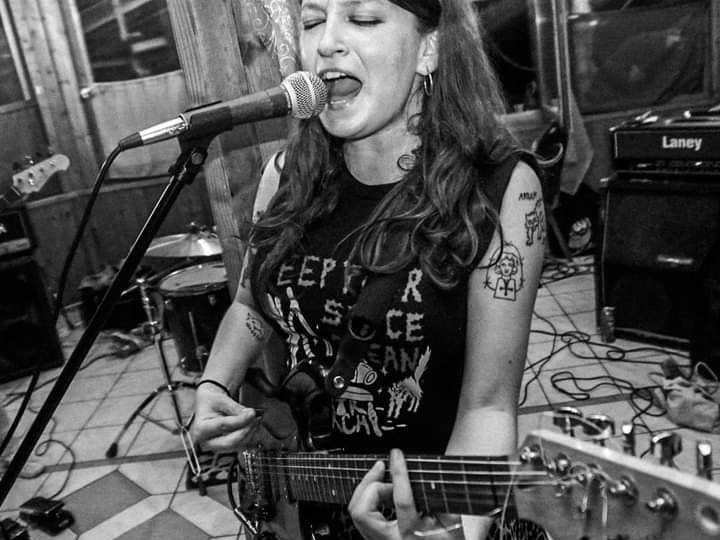
The underground music scene in Budapest is buzzing with a fresh wave of female artists. Club programs and local summer festivals like Kolorádó, Bánkitó, and Fekete Zaj allow visitors to explore the wide variety of female artists all year long. While the label Trottel Records has dropped two volumes of Riot! Women from the Hungarian Wasteland in 2023 and 2024 capturing the raw energy and diversity of Budapest’s feminist punk scene. This compilation is more than just music; it’s a historical snapshot of a movement that’s been bubbling under the surface for years. Some of these bands never made it past their demo tapes, yet their impact is still felt. Meanwhile, original members are evolving, forming new bands, and loudly claiming their space in the music scene.
But let’s not kid ourselves—rock is still a boys’ club, and Hungary is no different. Even in the supposedly progressive punk and underground scenes, female musicians face a gauntlet of microaggressions, patronizing attitudes, and outright suspicion. To get the inside story, I chatted with four female musicians about their experiences and the sexism that still taints Hungary’s indie music circles.
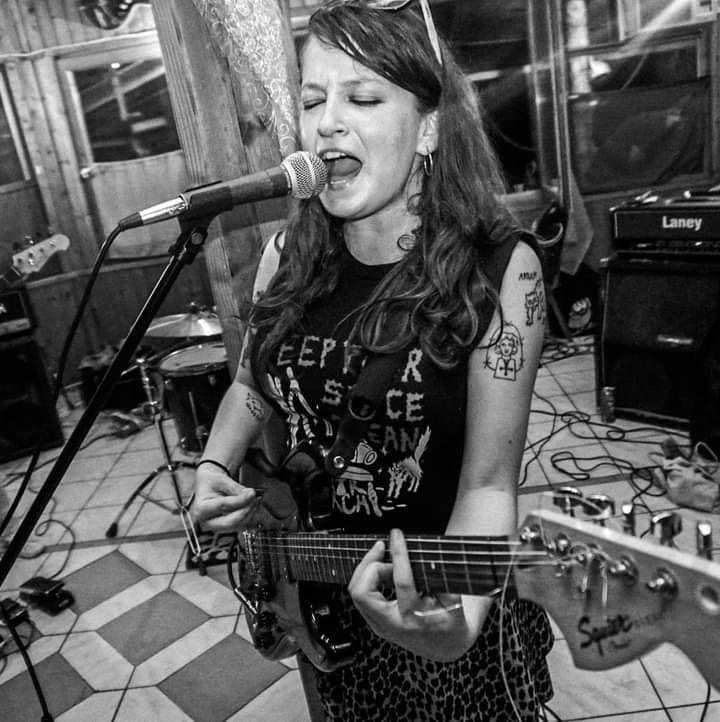
Viktória Taskovics, guitarist of Energia 80, previously in Macskanyelv, Testrablók, Shot in the Neck, singer of Halott Kígyók
Being a female musician has been a wild ride since I picked up the guitar at 12. Despite grinding hard and practicing daily, I watched as boys got all the praise, quickly labeled as geniuses or natural-born talents, while girls were sidelined.
One of my earliest punk band gigs was so disappointing. Local drunks yelled, “take the guitar away from the chick!”, and “show me your tits!” – while I was still only a kid. And it wasn’t much better with fellow musicians at the beginning. I once joined a new band, only to be told I was picked because I looked decorative. Often, you’re just there to boost the guys’ egos, making them look progressive with a female member. But your actual playing? Invisible. Back in the early 2010’s I was not allowed to play what I wanted, and if I did stand out, I was seen as a fraud. After one show with my fifth band, a sound guy even asked if I really composed my riffs.
Navigating the music scene was no walk in the park. First of all, there is an issue with representation: when you don’t see anyone like you succeeding, it’s easy to feel like an outsider, like you’re crashing a party you weren’t invited to. This feeling of alienation makes it tough to find your footing and claim your space. No wonder so many girls either quit or never even pick up an instrument. I stuck around, but I was constantly hit with sexism and misogyny, only to be told I was being too sensitive or overreacting whenever I tried to speak up. I bottled up my anger and sadness. My feminist awakening came later, after reflecting on the double standards and gaslighting I experienced. Lilla Neményi, a fellow musician from feminist punk bands like Camp Koala, Holnaplányok, and Macskanyelv, was a huge inspiration. She encouraged me to dive into feminist literature and stand up for myself when needed.
On a positive note, there are some bright spots. Right now in Hungary, there’s a fresh wave of young female musicians tackling heavy topics like abortion, rape culture, and patriarchy on stage. Some guys get visibly uncomfortable, angry, and frustrated when these issues come up, quickly shifting the focus to assure you they’re “good guys” and diving into “not all men” tirades instead of addressing the real problems. Right now, I’m lucky to be in a band with guys who are different from those I played with before. After so many struggles, I’m so happy to have finally ended up here.
Then there are sanctuaries like Kripta, a killer DIY autonomous space for radical music communities in Budapest. No institutions, no funding—just pure volunteer power. It’s a true safe space for underground music and feminism. And let’s not forget Ladyfest, a festival that’s been going on in Budapest for a few years now. It’s all about amplifying the voices of female artists, writers, and musicians. Over the years, it’s given the stage to countless all-female or female-fronted bands. Inspired by DIY rock camps, at the last edition, I ran a technical guitar workshop for women only. These events are all about girls sharing experiences, jamming together, and teaching each other. We experimented with sound and pedals in a safe space, and talked about the differences between institutional learning and the DIY approach to mastering the guitar. It’s my way of giving back to the scene and supporting the next generation of female musicians, just like the amazing women who supported me.
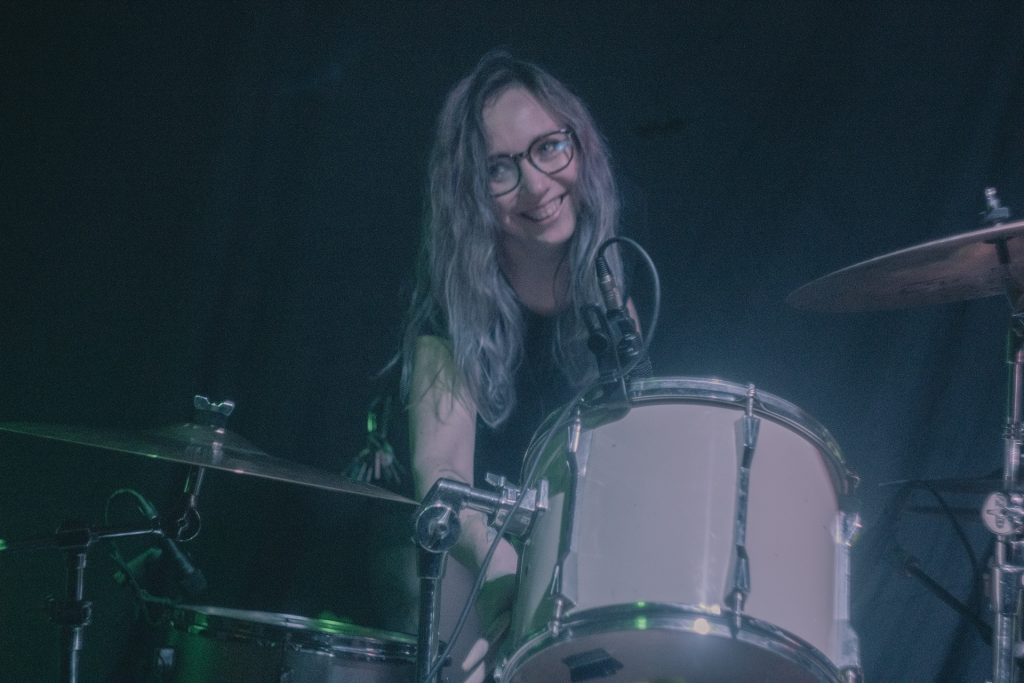
Magda Fábián, drummer of Hexa
When I was a kid, I took music theory after school, but singing was a no-go. I had a knack for rhythm, so I was nudged towards the flute. But then I hit my teenage years and decided it was time to do something cooler and ditch that goddamn flute, which had been social suicide. Being a massive Blink-182 fan and loving Travis Barker’s drumming, switching to drums was a no-brainer. I started drumming at 16, and despite some breaks, I’ve been at it ever since, playing in various punk and hardcore bands. Some were all-girl bands, like the feminist band Vex. Now, I’m with Hexa, a lo-fi noise pop emo trio originally started by Gabor Radi, a well-known name in the punk scene. Fanny Mommertz and I are also creatively involved in the project.
I’ve never doubted my place in the music scene, but my experience is a whole different ballgame compared to a man’s. Male musicians often assume I need help carrying, setting up, or packing my drum set. It’s tough to say no because they’re just trying to be nice, but why do they assume I can’t handle it myself? Then there’s the mansplaining. We had a gig in Bratislava, and it was awesome—until the other band’s drummer came up to me and bluntly said, “You should learn how to hit a crash cymbal with your other hand.” I froze, thinking, “Am I that bad? Is it that noticeable?” It ruined the whole experience. I spent weeks obsessing over my technique, only to realize I use both hands equally, and he wasn’t right. A guy would never dare to give another male drummer such unsolicited criticism.
No one looks at a male musician and judges all men based on his performance. Instead, being a female musician means you end up representing all women in music. If you mess up, it reflects on every female musician out there. It’s exhausting always having to be a role model, the best version of yourself. Sometimes it sucks the joy out of playing. Women in music face more criticism and scrutiny. It’s no wonder we often feel insecure. You need solid friends, a supportive community, and a good dose of therapy to stay sane.
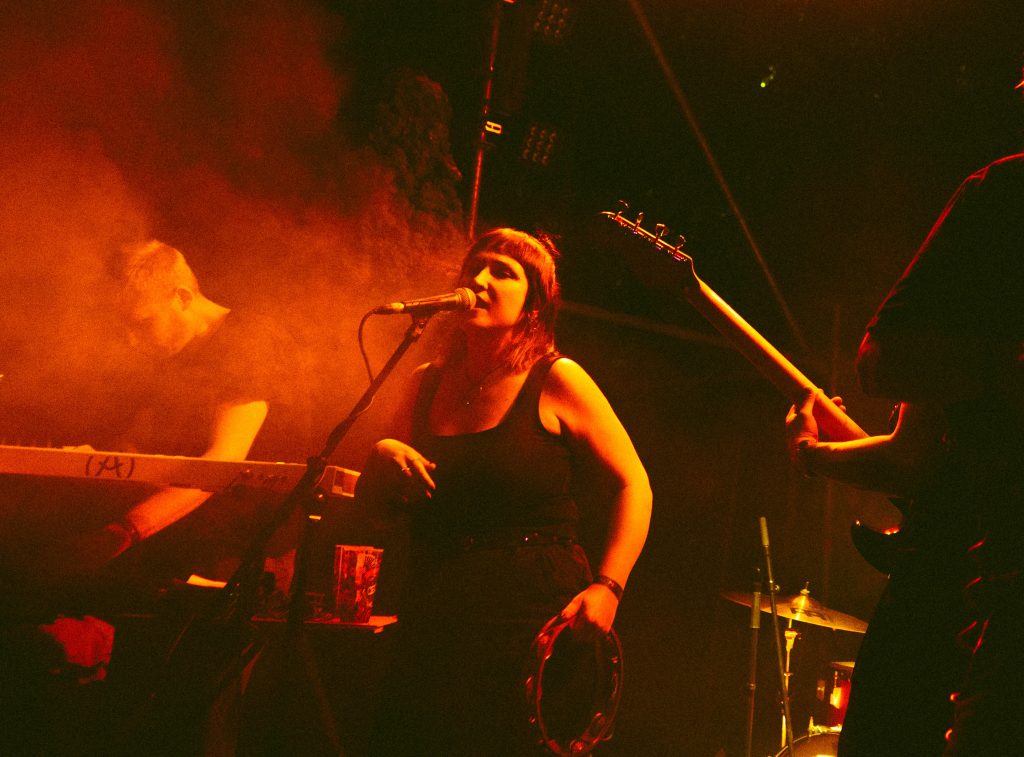
Ági Csóka, songwriter and producer of Lady/Bird; vocals in DARĀGE
I dove into the Hungarian underground scene about a decade ago, writing for pop culture and music outlets like Keret and Phenom. That’s when I started crafting my own songs with my first band, Lightning Field. Determined to shake things up, I formed Disco Nap, one of the few all-female bands in the Hungarian scene at the time. Making that band happen is one of my proudest achievements. These days, my music life is a bit split. I’m the second vocalist and lyric contributor for the garage rock/psych rock band DARĀGE. I also have a personal project called Lady/Bird, which turned into this intimate, mellow music journey.
On a personal level, my journey has been mostly positive. I’ve crossed paths with supportive male bands, bookers, journalists, and music enthusiasts, not to mention the guys I’ve jammed with in various bands. Sure, there’s the occasional run-in with a bouncer or sound engineer—usually older—who ranges from condescending to downright inappropriate, but even that’s becoming less frequent.
The most blatant sexism I’ve faced has been institutional. Last year, the committee of a state programme supporting emerging bands only had one woman on it. Out of twenty bands selected, only about three had female members. Thankfully, the independent scene doesn’t rely on state funds. Each year, I see more girls in alternative Hungarian festivals and club lineups, which is refreshing. But having more girls in bands isn’t enough. We need female managers, bookers, and film students to help with video materials and tell different stories through their music videos. Without these unsung heroes breaking the glass ceiling, real change won’t happen.
Broadly speaking, girls in music often have to fit into one of two boxes to get attention: sweet and relatable, or using their appearance and sexuality as part of their act. This isn’t always the case, and many women use these elements creatively. But male musicians have more freedom to express and experiment. I know my personal project reaches fewer people because it lacks “mainstream girliness” and “sexiness.”
The female artists I admire most are those who not only sing but also play instruments and write their own songs. I’m also out here writing lyrics, crafting melodies, and producing tracks from scratch. This comprehensive approach feels like a greater accomplishment. That’s why it stings a bit when people, mostly men, simply label me as a singer, which is a more stereotypical category for female musicians. While being a good singer is an art in itself, I wish there was more recognition for the more complex nature of my work.
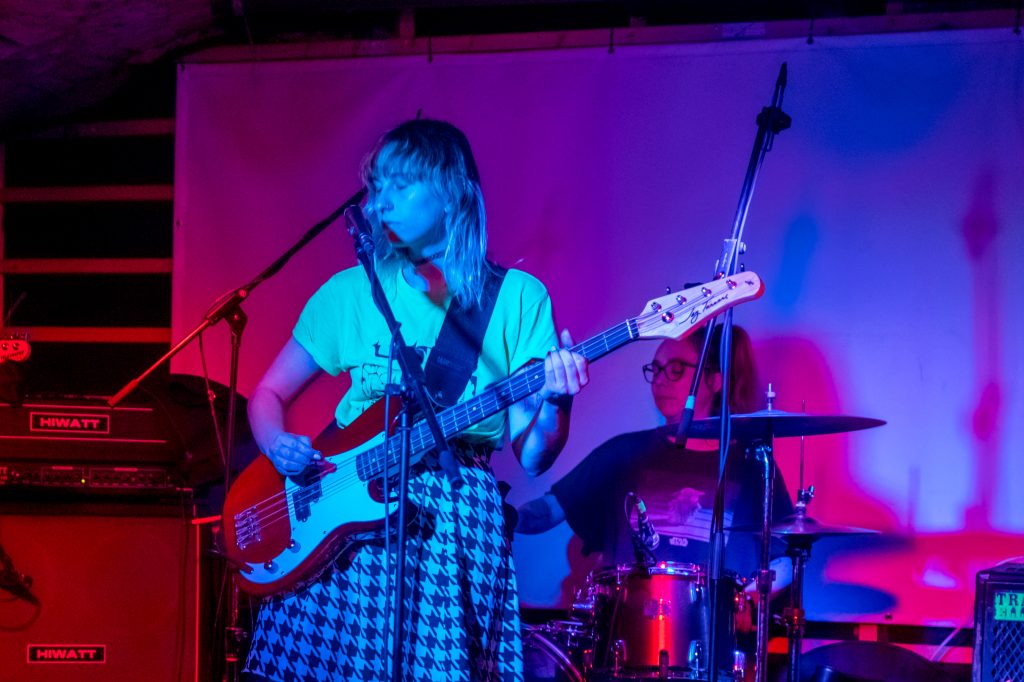
Fanny Mommertz, bass and vocals in Hexa
Growing up in Szolnok, a small town in Eastern Hungary, was pretty lonely. With not much to do, I turned to music. Punk became my escape, and joining a band felt like the next logical step. It was a way to express myself, and honestly, I didn’t feel pretty, so I thought making music would get guys to notice me. I believed that by being different and cooler than other girls, I could win the competition for men’s attention. In my countryside upbringing, I was taught that to become somebody and fulfill my “female destiny,” I had to be someone’s girlfriend.
Moving to Budapest for university was a game-changer. It helped me start deconstructing these thoughts, but it took a long time. Even now, I talk about this carefully, fearing I’ll be seen as frivolous. As a female musician, you have to prove you deserve to be part of the scene, constantly justifying your existence and proving to be 100% authentic.
I play bass and sing in Hexa, a trio where two of us are women. This often puts us in awkward situations: we’re frequently invited to play when another foreign act with female members comes to Budapest, even if we don’t have much in common musically. It’s an internal conflict for me. I’m happy to play more and don’t mind a bit of “positive discrimination,” but what about our music? I want to be seen as a musician, not just a female quota.
The Budapest underground music scene is more progressive than Hungarian society, with a basic understanding of feminist ethics, no doubt. If someone commits sexual harassment at a gig, they’re immediately kicked out. Some bands with well-known abusers are barred from playing in Budapest but can still perform in the countryside, where nobody cares. This self-assuring belief makes men in the Budapest underground scene think they don’t need to do any extra work. Meanwhile, microaggressions, double standards, and subtler forms of sexism are still everywhere. I see more self-reflection and positive change in men who are in serious relationships with women. Men without women’s direct influence don’t seem to care as much.
We’re quite far from the sensitivity I have experienced in the punk scene abroad. Take EKH, a self-managed social center in Vienna where we played once. There, male musicians aren’t allowed to take off their shirts on stage for the sake of gender equality. The idea is that women can’t equally do that because of the male gaze and the sexualization of the female body. It’s a small but significant step.
Text by Alessandro Pilo.
—
Alessandro Pilo is an Italian freelance journalist based in Budapest. He has written for Vice, Wired, HuffPost, and La Stampa, among others, covering politics, environmental issues, and underground culture.
—
This article is brought to you as part of the EM GUIDE project – an initiative dedicated to empowering independent music magazines and strengthen the underground music scene in Europe. Read more about the project at emgui.de.
Funded by the European Union. Views and opinions expressed are however those of the author(s) only and do not necessarily reflect those of the European Union or the European Education and Culture Executive Agency (EACEA). Neither the European Union nor EACEA can be held responsible for them.